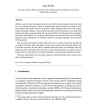Free Online Productivity Tools
i2Speak
i2Symbol
i2OCR
iTex2Img
iWeb2Print
iWeb2Shot
i2Type
iPdf2Split
iPdf2Merge
i2Bopomofo
i2Arabic
i2Style
i2Image
i2PDF
iLatex2Rtf
Sci2ools
143
click to vote
JSS
2006
2006
Effects of context on program slicing
Whether context-sensitive program analysis is more effective than context-insensitive analysis is an ongoing discussion. There is evidence that context-sensitivity matters in complex analyses like pointer analysis or program slicing. Empirical data shows that contextsensitive program slicing is more precise and under some circumstances even faster than context-insensitive program slicing. This article will add to the discussion by examining if the context itself matters, i.e. if a given context leads to more precise slices for that context. Based on some experiments, we will show that this is strongly dependent on the structure of the programs. The presented experiments require backward slices to return to call sites specified by act call stack. Such call stacks can be seen as a poor man's dynamic slicing: For a concrete execution, the call stack is captured, and static slices are restricted to the captured stack. The experiments show that for recursive programs there is a large ...
Related Content
| Added | 13 Dec 2010 |
| Updated | 13 Dec 2010 |
| Type | Journal |
| Year | 2006 |
| Where | JSS |
| Authors | Jens Krinke |
Comments (0)

